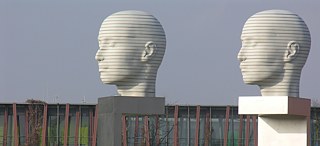Interview
Discovering Muslim Diversity

Goethe-Institut director Dr. Heinrich Blömeke and university lecturer Muhammad Heychael about impressions and insights of our study trip programs 2017 and 2018.
Dr. Blömeke, could you briefly describe for us the reasons Goethe-Institut Jakarta initiated the project?
For very different reasons, in recent years Indonesia and Germany have experienced an intensification of the discussion about the role of religion in public and political sectors. Germany, which was historically shaped by Christian denominations but which considers itself a secular state, has developed into a multi-religious and multi-cultural society as a result of immigration, primarily of Muslims. Currently, 5–6 % of the population living in Germany are Muslims, of which 75% are Sunnis.
The issues and frictions accompanying this cultural change in Germany are also relevant to Goethe-Institut’s information mandate, and of course they also invite dialogue between German and Indonesian stakeholders who have never worked together with the German cultural institute.
For young Muslim intellectuals from Indonesia, life in a secular and multi-religious environment is interesting for a number of reasons. How are religious beliefs experienced in a secular society? How is the relationship between the Muslim minority and the other religious communities shaped? How do the various Muslim groups – Sunnis, Alevi, Shiites, Alawites, Ahmadis etc. – interact with each other?
What criteria were used to select the fourteen participants for the study tour?
Young Muslim intellectuals were particularly favored who are disseminators in religious or public educational institutions or in the media sector; the participants are thus lecturers, journalists, activists, and members of the millennial generation (25–35 years old). It was important that the project participants were interested in such a program focused on information and encounter. Also key was that they are in a position to be able to communicate and share their impressions and experiences.
Mr. Heychael, you were one of the participants in 2017. What motivated you to join the program “Life of Muslims in Germany”?
As a Sunni Muslim I belong to the religious majority here in Indonesia. That’s why I wanted to see how Muslims live in Germany and to experience it from the perspective of a religious minority. That was my main motivation. I wanted to understand how people feel being Christians or members of another religion here.
During the trip, what was the biggest difference you noticed between Muslim communities in Germany and Indonesia?
For me it was how diverse the Muslim communities in Germany are. We are also diverse here in Indonesia, but we don’t have the kind of diversity Germany has. There you have, for example, the Alevi Muslims – they were something completely new for me. All of these different communities live together side by side and there is no such thing as conflict. That really amazed me.
What was your personal highlight during the program in Germany?
As I mentioned, I actually wanted to see how Muslims live as a minority. But the most interesting thing for me in the end was how Germans appreciate their own history, how they preserve history in their daily life. It really struck me, because here in Indonesia we have so many problems with historical incidents, such as the mass killings in 1965, but we don’t acknowledge them in our history. The experience in Germany gave me a new perspective about how we can actually live with our own history.
Dr. Blömeke, what can the participants expect for the 2018 study tour?
Through visits, encounters and conversations they will learn about the conjunction of religious practice and the daily life of Muslims as well as the role Islam plays in German culture and educational institutions, for example museums and universities. Further, in discussions with representatives of Muslim organizations and associations and by meeting with politicians, the study tour participants will become acquainted with the sensitive religious issues existing in secular societies; this refers to frictions and areas of conflict between members of different religious orientations and public institutions.
Mr. Heychael, as an alumnus of the program, what personal advice would you give to those going with the program to Germany in 2018?
I think they have the chance to learn a lot. The most important thing is to reflect on the life of Muslims over there and how our life is here. This is the most important thing.